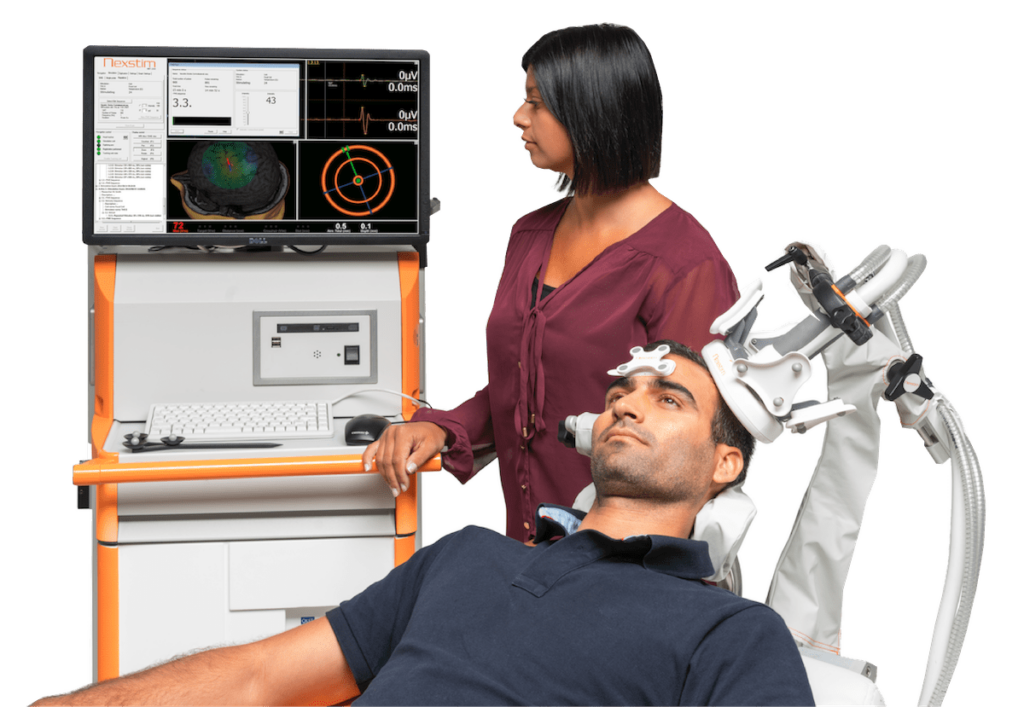THE BREAKTHROUGH TREATMENT FOR MEDICATION-RESISTANT DEPRESSION
Find Relief Through TMS Therapy
Transcranial Magnetic Stimulation (TMS Treatment) is a non-invasive procedure used to treat certain psychiatric and neurological conditions. TMS has been shown to be a safe and effective treatment for depression, particularly when other treatment options have not been successful. If you suffer from depression and have been unable to find relief from your symptoms, TMS therapy may be a viable solution. Find a Geode Health location near you to discuss your treatment options.
And many more…



Find Help for Persistent Depression with TMS
TMS therapy can be a highly effective, life-changing treatment for those suffering from depression, especially when other treatments have not been successful. At Geode Health, we are committed to providing you with personalized care in a safe and supportive environment. Our team of professionals is dedicated to helping you find relief from your depression symptoms and improving your overall quality of life. Speak with your Geode Health provider to determine if TMS is the right option for you.
If you are not ready to book a screening but would like to speak with someone about booking a TMS screening, contact our call center at (888) 902-1704
TMS Is Now Available at the Following Geode Locations:
- Rockford, IL
- Flower Mound, TX
- Fort Worth, TX
- Round Rock, TX
- Suwanee, GA
Frequently Asked Questions About TMS
TMS works by using a magnetic field brain stimulation on targetted areas. The magnetic pulses modulate the activity of neurons in the targeted area, helping to improve your mood and ease the symptoms of depression.
During treatment sessions, you will be awake and alert. Your Geode provider will place a specialized magnet near your head and send magnetic pulses to specific areas of the brain. Patients will usually receive treatment five times a week for four to six weeks.
TMS is a safe and effective treatment option for those suffering from depression, including treatment-resistant depression. If you have not been able to find relief from your depression symptoms with other forms of treatment, such as antidepressant medications or cognitive behavioral therapy, Transcranial Magnetic Stimulation therapy may be the right choice for you.
Patients generally do not experience any long-term side effects from TMS. As a non-invasive procedure, TMS does not require the use of anesthesia or other medications.
TMS is generally well-tolerated, and most patients experience minimal to no side effects. The most common side effects include scalp discomfort and headache, which usually resolve once the treatment session is over. More serious side effects such as seizures are very rare. Patients can typically return to their daily activities immediately after the treatment session.
Most major insurance carriers cover TMS, although the specific requirements vary from plan to plan. You may need a documented diagnosis of an approved condition, such as major depressive disorder. Your insurance provider may require that you have tried other treatments such as antidepressant medications and therapy without resolution of your symptoms.
To determine if your insurance policy covers TMS, contact your insurer directly or speak with a qualified Geode provider.
While most well-known for treating depression, TMS is FDA-approved for the following mental health conditions:
- Major depressive disorder (MDD), including treatment-resistant depression and anxiety symptoms associated with depression
- Obsessive-compulsive disorder (OCD)
- Smoking cessation
- Studies have suggested that TMS may also be beneficial for individuals with post-traumatic stress disorder (PTSD), anxiety, and other conditions, although these remain active areas of research.
The following criteria outline the eligibility requirements for patients considering Transcranial Magnetic Stimulation (TMS) as a treatment option:
- Diagnosis of Major Depressive Disorder (MDD) or other depressive disorders, such as treatment-resistant depression (TRD).
- Failure to achieve satisfactory improvement with one or more antidepressant medications, indicating treatment resistance.
- Ineligibility for, or limited response to, alternative treatment options such as psychotherapy or electroconvulsive therapy (ECT).
- Absence of metallic implants or devices in or near the head, as these can interfere with the magnetic fields generated by TMS.
- Absence of any condition that increases the risk of seizures, as TMS can potentially trigger seizures in susceptible individuals.
- No active substance abuse or dependence issues, as these can interfere with the effectiveness of TMS treatment.
- Not currently pregnant, planning to become pregnant, or breastfeeding, due to potential risks to the fetus or infant from TMS exposure.
- Must be at least 18 years of age.
Please note: Geode Health currently offers TMS treatment for Major Depressive Disorder (MDD) or treatment-resistant depression.